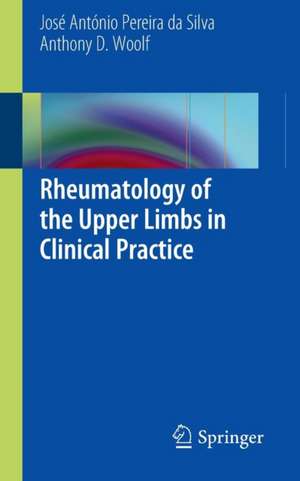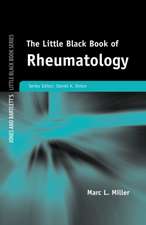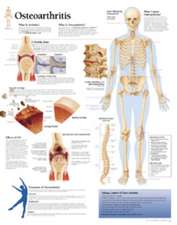Rheumatology of the Upper Limbs in Clinical Practice
Autor Jose Antonio Pereira da Silva, Anthony D. Woolfen Limba Engleză Paperback – 16 dec 2011
It combines instructive sections, providing anatomical information and various causes of particular symptoms. Case studies recreate the clinical setting by presenting the details of the case and giving an opportunity for the reader to make a diagnosis.
The text is lavishly illustrated in full color, with detailed photos of patient examinations, complemented by radiographs and full color line illustrations. The text also benefits from the use of summaries using colored boxing to identify key points in diagnosis and management.
Written by two of the biggest and most respected clinicians in the discipline, this book will be essential reading for rheumatologists in practice and training.
Preț: 359.21 lei
Preț vechi: 378.12 lei
-5% Nou
Puncte Express: 539
Preț estimativ în valută:
68.74€ • 74.64$ • 57.74£
68.74€ • 74.64$ • 57.74£
Carte tipărită la comandă
Livrare economică 23 aprilie-07 mai
Preluare comenzi: 021 569.72.76
Specificații
ISBN-13: 9781447122418
ISBN-10: 1447122410
Pagini: 142
Ilustrații: VII, 142 p. 78 illus., 67 illus. in color.
Dimensiuni: 127 x 203 x 8 mm
Greutate: 0.18 kg
Ediția:2012
Editura: SPRINGER LONDON
Colecția Springer
Locul publicării:London, United Kingdom
ISBN-10: 1447122410
Pagini: 142
Ilustrații: VII, 142 p. 78 illus., 67 illus. in color.
Dimensiuni: 127 x 203 x 8 mm
Greutate: 0.18 kg
Ediția:2012
Editura: SPRINGER LONDON
Colecția Springer
Locul publicării:London, United Kingdom
Public țintă
Professional/practitionerCuprins
Regional Syndromes: The Painful Shoulder.- Regional Syndromes: The Elbow and Forearm.- Regional Syndromes: the Wrist and Hand.
Textul de pe ultima copertă
Rheumatology of the Upper Limbs in Clinical Practice is a comprehensive and easy-to-use training tool for practitioners to refine their strategy for clinical investigation and differential diagnosis in regional syndromes of the shoulder, elbow, forearm, wrist and hand.
It combines instructive sections, providing anatomical information and various causes of particular symptoms. Case studies recreate the clinical setting by presenting the details of the case and giving an opportunity for the reader to make a diagnosis.
The text is lavishly illustrated in full color, with detailed photos of patient examinations, complemented by radiographs and full color line illustrations. The text also benefits from the use of summaries using colored boxing to identify key points in diagnosis and management.
Written by two of the biggest and most respected clinicians in the discipline, this book will be essential reading for rheumatologists in practice and training.
It combines instructive sections, providing anatomical information and various causes of particular symptoms. Case studies recreate the clinical setting by presenting the details of the case and giving an opportunity for the reader to make a diagnosis.
The text is lavishly illustrated in full color, with detailed photos of patient examinations, complemented by radiographs and full color line illustrations. The text also benefits from the use of summaries using colored boxing to identify key points in diagnosis and management.
Written by two of the biggest and most respected clinicians in the discipline, this book will be essential reading for rheumatologists in practice and training.
Caracteristici
Uses an evidence-based approach with emphasis on diagnostic skills. This provides the trainee with the skills and diagnostic tools needed to cope with any clinical problem he or she is likely to encounter Both editors are internationally known and respected. This gives the book credibility amongst its intended audience and more likely to be adopted at institutions and on reading lists particularly in Europe Use of question and answer format and consistently challenging questions throughout the text. This encourages the reader to learn and reinforces the basic principles of diagnostic skills Full colour illustrations in clinical examination and highlighted and boxed key points. Makes the text more reader friendly, encourages the retention of principles and key points in diagnosis and treatment









